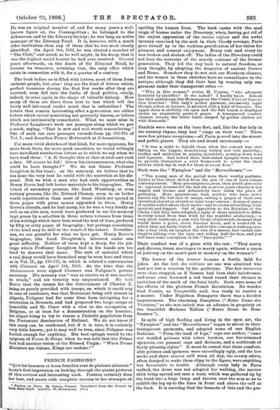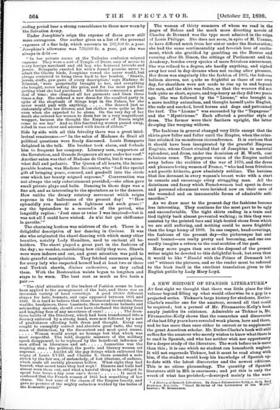Victoires," as she was called) was an advance in propriety
on the beautiful Madame Tallien (" Notre Dame de Bone Secours ").
In spite of high feeding and living in the open air, the "Nymphes" and the "Merveilleuses" began to shiver in their transparent garments, and adopted some of our English fashions. "From the land of fogs," says our author, "'came our wadded pelisses with velvet borders, our fur-trimmed spencers, our peasant caps and dolmans, and a multitude of fairly pleasing styles." It must be owned that these comfort- able pelisses and spencers were exceedingly ugly, and the low necks and short sleeves still worn all day, the scanty skirts, often damped to make them cling to the figure, were anything but favourable to health. Although every lady in Paris walked, the dress was not adapted for walking, the narrow skirt being spread out into a train which was gathered up by the hand into a huge lump and thrown over the arm so as to exhibit the leg up to the knee in front and above the calf at the back. It is amusing that the bonnets of this and the pre- the Salvation Army.
Under Josephine's reign the expense of dress grew still more outrageous. Our author gives us a list of the personal expenses of a fine lady, which amounts to `202.,S00 fr. a year. Josephine's allowance was 730,000 fr. a year, yet she was
always in debt :—
"In her private rooms at the Tuileries confusion reigned supreme They were a sort of Temple of Dress, easy of access to e% cry foreign merchant and old hag who b3rtered brocade and jewets. Bonaparte exacted his wite's forma promise never to admit the Ghetto birds, Josephine vowed she never would, but always contrived to bring them back to her boudoir. 'Shawls, jewels, stuffs, gewgaws of every description,' says Madame de liemusat, were perpetually brought to her, and everything she bought, never asking the price, and for the most part for- getting what she had purchased. Her toilette consumed a great deal of time; she changed all her garments and linen throe times a day. She ordered a new dress for the smallest party in spite of the shoploads of things kept in the Palace, for she
never would part with anything She dressed just as elaborately after her divorce, and her clothes were quite as fine even when she expected to be alone. On the very day of her death she ordered her women to dress her in a very magnificent wrapper, because she thought the Emperor of P.ussia might come to see her.' And so this fascinating woman passed away, robed in rose colour and adorned with knots of ribbon."
Side by side with all this frivolity there was a great intel- lectual renaissance :—" In the salon of Madame de Staid all political questions were freely discussed. Louis Bonaparte delighted in the talk. His brother took alarm, and forbade him to frequent her company. Literary men, supporters of the Revolution, and Grande Seigneurs all met under her roof." Another salon was that of Madame de Geniis, but it was some- what dull and pedantic. The Queen of all hearts, the incom- parable hostess, was Madame Recamier, who " had the special gift of bringing peace, concord, and goodwill into the circle over which her beauty reigned supreme." Conversation was not always the only entertainment provided,—she often gave small private plays and balls. Dancing in those days was a fine art, and as interesting to the spectators as to the dancers. How unlike the dreary rotatory movement which reigns supreme in the ballrooms of the present day ! "'How splendidly you danced! such lightness and such grace!' say the bystanders to a museadin of the period, who languidly replies : 'Just once or twice I was inspired—but it was not all I could have wished. Je n'ai fait que chiffonner la gavotte.'"











































 Previous page
Previous page